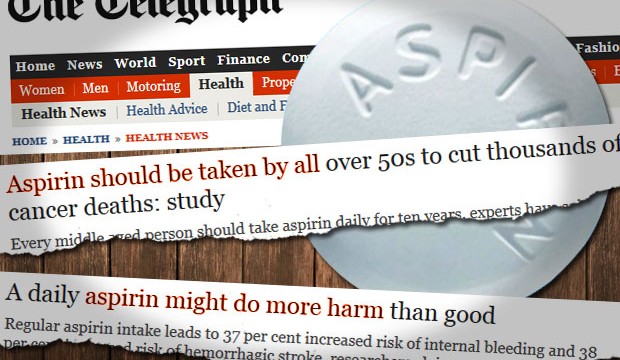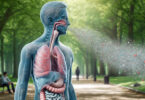Guest Writer for Wake Up World
We’ve all heard that coffee is bad for you. Or is it good for you? Butter and eggs used to be bad for you, but now they’re good… or are they?
The mainstream media is constantly reporting on new scientific medical studies, dishing out more advice than a doctor on what (and what not) to consume to maintain our health. One month something will kill you, the next month it will save your life.
Take this recent example. A couple weeks ago, The Telegraph reported that, based on a new scientific study, all adults over the age of 50 should take aspirin every single day as a preventative measure to stave off cancer and heart disease. Everyone. Regardless of their previous warnings.
Are you over 50? Is your mom? Your grandma? Well according to The Telegraph’s reporting on this new study, you better be taking a daily aspirin every day for a decade. As The Telegraph reported:
“Middle-aged adults should take aspirin every day for ten years, according to scientists who found it could save more than 6,000 lives a year by preventing cancer and heart disease. Daily aspirin can prevent up to one third of cancers of the bowel, throat and stomach and can halve the risk of dying in some cases, according to the the largest, most comprehensive analysis of the drugs use.”
The article goes on to downplay the risks associated with taking a daily aspirin, stating: “It comes after previous research raised concerns about the side effects of aspirin, which include bleeding and ulcers. The new study found that while there was a small increased risk of a stroke, stomach bleeding and ulcers, the benefits of taking aspirin made it a ‘good bet’.”
A “small” increased risk of a stroke? Hm. That must be why the exact same media outlet reported back in December that “a daily aspirin may do more harm than good”, and noted that researchers at that time were claiming that regularly taking aspirin led to a 37 percent increased risk of internal bleeding and 38 percent increased risk of hemorrhagic stroke.
So which is it? Aspirin is good to stave off heart disease, but only if you want a nearly 40 percent increased risk of suffering a potentially deadly hemorrhagic stroke? How is that even remotely a “good bet”? Anyone??
Corporate Junk Science
So, listen to The Telegraph and go ahead and take aspirin every day for 10 years, you know… just in case. Never mind that it is already on record that drugs approved by the U.S. Food and Drug Administration kill 100,000 people every year who took the drugs as prescribed – this latest study claims it will save 6,000 lives. Notably, The Telegraph reporter doesn’t declare this little factoid about prescription death rates on the aspirin study until the very last line of her article: “Several of the authors of the analysis declared that they have worked for the pharmaceutical industry connected to aspirin but that the findings and conclusions in the study do not represent their respective organisations. [emphasis added]
This is the other side of “science” — the bought-and-paid-for “science” conducted to paint the proper picture for whatever industry is funding it. Sadly though, most people do not read articles all the way to the end. Most casual mainstream media customers will read a headline and if it grabs them, they might skim the first few paragraphs, meaning they will seldom read the part where the industry itself is essentially revealed to be paying for the so-called “science” that propagates the false belief that these profitable products are good for them. (For more information, please see: The Top 10 Tricks Used by Corporate Junk Science.)
And this is just one example. This happens all the time, to the point that most people don’t know what’s healthy or not anymore, based on mainstream media standards. This isn’t to say that science gets everything wrong, obviously, but it illustrate that science can be paid for by corporate interests to say what those interests want it to say. And even a broken clock is right twice a day.
Nature’s Solutions
Dr. Russell Blaylock is a board certified neurosurgeon, author and lecturer who has dedicated his work to actually looking at the root cause of health issues so they can truly be cured with natural means, rather than patching over symptoms with potentially harmful pharmaceutical treatments that are never actually intended to “cure” anything in the first place (because there’s no real money to be made in cures).
Writing on aspirin as a blood thinner in his book Health and Nutrition Secrets, Dr. Blaylock says that strokes are a huge concern with taking a daily aspirin, noting, “One of the largest stroke-prevention studies using aspirin, the Physician’s Health Study, involved 22,000 physicians and found that patients taking aspirin had twice as many brain hemorrhages as those who did not take aspirin.”
Dr. Blaylock went on to point out that that the problem with just taking a daily aspirin to prevent strokes and heart attacks is that it doesn’t do anything to strengthen the actual blood vessels themselves, something people who are concerned with heart issues should definitely take into consideration. Basically a weak blood vessel carrying thinned out blood is the perfect set up for a stroke. Makes sense.
Blaylock goes on to say that the herb Gingko Biloba not only thins the blood, but helps strengthen the collagen and elastin in blood vessel walls. In addition, flavonoids contained in Ginkgo biloba protect from free radical damage. (Learn more: Study Confirms Gingko Biloba Aids Stroke Recovery.) These benefits are in addition to other numerous health effects of Ginkgo Biloba as reported by numerous other natural health outlets, including: (source)
- Enhances memory
- Uplifts the spirit
- Strengthens the eyes
- Relaxes constricted blood vessels
- Improves circulation
- Acts as an energy restorative
- Provides antioxidant boost
- Relieves tension and anxiety
But Ginkgo biloba isn’t a manufactured chemical produced for a Big Pharma company in the past 100 years; it’s a plant that has been around for millions of years and has been used medicinally since long before aspirin was ever synthesized. But what does nature know? But by now, if we believe mainstream media’s medical advice, we should all be asking ourselves how anyone anywhere in the history of humanity managed to live to be over 60 before we could take aspirin every single day. Insanity.
For more scientific explanations on how to enhance your health naturally with nutrition – simply paying more attention to what you’re eating and drinking and how it effects your life – check out Dr. Blaylock’s book Health and Nutrition Secrets.
Previous article By Melissa Melton:
About the author:

If you've found value in our articles, we invite you to support the release of our brand-new book, "Gratitude Practices for Kids: A Practical Guide for Adults to Instill a Spirit of Appreciation and Positivity in the Next Generation."
"Gratitude Practices for Kids" brings together over 25 innovative and accessible practices designed to enhance gratitude in everyday life. This comprehensive guide is backed by 17 scientific studies, ensuring each concept is grounded in research, underscoring our commitment to nurturing growth, emotional intelligence, and positive interactions between adults and children.
We encourage you to opt for the paperback version to celebrate this new release. Dive into its fresh pages away from digital distractions, allowing you to immerse yourself in the transformative practices it offers.
Over recent years, Wake Up World has faced significant online censorship, which has impacted our financial ability to operate. Moving into book publishing represents a strategic step to secure the ongoing funds needed to continue our mission. By purchasing Gratitude for Kids, you help us keep our content free and accessible to everyone, avoiding needing a paywall. With over 8,500 articles published in the last 13 years, we remain dedicated to keeping our valuable content open to all.










